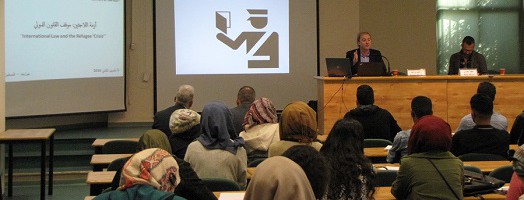International Law and the Refugee Crisis
On Thursday, 3 November 2016, the Institute of Law and the Faculty of Law and Public Administration at Birzeit University, with support from the Konrad Adenauer Stiftung, held a legal encounter entitled “International Law and the Refugee ‘Crisis’”
before a large audience of academics, students and members of civil society. The lecture was provided by Dr. Ralph Wilde, Member of the Faculty of Laws at the University College – London, who is currently engaged in an interdisciplinary research project on the extraterritorial application of international human rights law.
Dr. Wilde spoke generally about the difficulties and challenges faced by refugees and migrants and explained that more steps should be taken to protect them, but that the bulk of the responsibility is not shared and taken by a few States. It is not a European problem, as recent cases have shown in Haiti, Mexico, with the Rohingya in Burma, and elsewhere.
He began with the application of international human rights law and the principle of non-refoulement where people cannot be returned to face human rights abuses. He explained the challenges in the extraterritorial applicability of human rights in actions at seas, where authorities do not provide protection, but rather push them away in their attempts to stop them from reaching their borders. States are engaged in extraterritorial transfers, where States intercept migrants and push them elsewhere, with the examples of recent policies and practices of Italy and Australia. Additionally, during “anti-piracy” campaigns, individuals are intercepted and taken to be prosecuted in another State. He explained the practices and policies of "non-entree", with the overall aim of preventing individuals from being able to enter countries from outside their borders. Some examples include the extraterritorial immigration checks such as for trains and airplanes.
Overall, States have interpreted the Refugee Convention as providing them with the ability to prevent individuals from reaching their borders. States have interpreted this as a right to close their borders. Nevertheless, international human rights law should continue to apply extraterritorially, as affirmed by the ICJ Advisory Opinion on the Wall, which would include the principle of non-refoulement. Yet in the EU, there are practical challenges as individuals may reach certain States in an attempt to reach others, but the law does not give those people a right to move beyond those borders.
Finally, Dr. Wilde explained the challenges faced by the global refugee phenomenon, as most refugees are in developing countries. The UN High Commission for Refugees operates on a voluntary annual budget. Wealthy States commit financial resources to the UNHCR and view this as an alternative system of “responsibility-sharing”. Many of these States take parts of their overall “development assistance” budgets, rather than increasing budgets for the purposes of refugees, making conditions worse.











